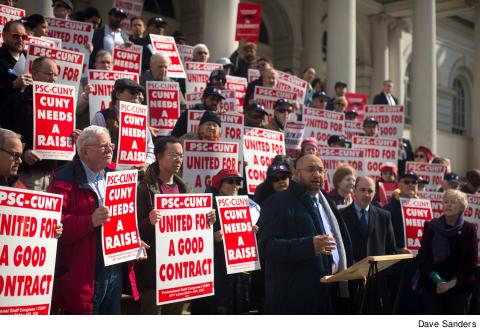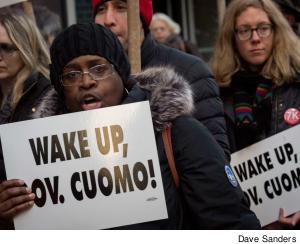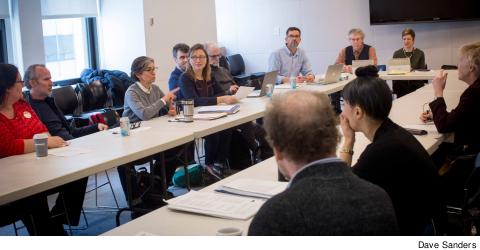Labor rejects economic austerity at CUNY
 |
The message to the state, the city and CUNY is clear: the PSC will not back down from its demand for a fair contract for all and an end to poverty-level pay for adjunct faculty. On March 14, the PSC held demonstrations at both the governor’s office and City Hall, and then presented a sweeping counterproposal to management across the bargaining table. “The fundamental issue in this contract is funding,” said PSC President Barbara Bowen. “By insisting on decent raises and calling for an end to CUNY’s exploitation of adjunct faculty, the union is challenging the poverty-funding model for CUNY. We are demanding resources for our students.”
ONE YEAR
More than a year after the last contract expired, the administration in late February finally made an economic offer. But the offer did not come close to what the union has demanded. Rather than providing even inflation-level increases and substantially lifting adjunct pay, CUNY management offered what Bowen called “a zero-sum-game approach.”
Management offered a higher increase for adjunct faculty than for other members of the bargaining unit – a first in PSC bargaining history – but proposed to fund the increase by gouging the money out of the same austerity settlement reached by other New York unions. Further, management’s proposal included no back pay and a zero-percent increase in the final year.
FALLING SHORT
The proposed raise for adjunct faculty fell far short of the union demand for $7,000 per course, a demand that seeks to put CUNY adjunct pay in line with adjunct salaries at peer institutions. Management’s proposal would have raised the minimum pay for a three-credit course to only $4,000.
The union responded on March 14 with an innovative counterproposal and the firm position that the state and city must put more money into CUNY in order to resolve the contract.
Earlier that day, union members had come together for a daylong set of actions to pressure the city, state and CUNY administration to deliver a just contract. Starting at 8 am outside Governor Andrew Cuomo’s Midtown Manhattan office, more than 300 PSC members, armed with ringing alarm clocks and supported by a brass band, delivered a “wake- up call” to the governor. Chanting “Full-time, part-time – all unite. Same struggle, same fight,” and “No contract, no peace,” members demanded that the governor agree to a state budget for next year that increases funding for CUNY, providing more resources for a fair contract.
 |
Just hours later, members were out in force on the steps of City Hall to deliver a similar message: the city must also step up to put more money into CUNY in order to alleviate decades of underfunding. Joined by labor leaders from across the city, PSC President Barbara Bowen said, “There is no justification to keep CUNY under-resourced…it’s a sign of contempt for the people we serve,” noting that both the governor and Mayor Bill de Blasio point to their records as progressives. “Show us the money, show us your progressive values,” she said.
Vincent Alvarez, president of the New York City Central Labor Council (CLC), decried the low pay for adjunct faculty. “One job should be enough,” he said, noting that many CUNY adjuncts work many other part-time jobs to survive. “You’re talking about minimum wage jobs in the city of New York, and that’s unacceptable.”
District Council 37 Executive Director Henry Garrido, who represents 10,000 CUNY clerical workers who recently settled a contract with the administration, said since PSC stood by his members in their contract fight, his union would fight for the PSC. He said, as a CUNY graduate, the fight for fair wages at CUNY was a citywide struggle. “It’s the people’s university,” he said.
SOLIDARITY
At City Hall, Bowen addressed members, saying it was important that labor leaders from the CLC and AFSCME District Council 37 – as well as representatives from the United Federation of Teachers, University Student Senate and the New York State Nurses Association – had come out to demonstrate their support for the PSC. “Something important happened today,” Bowen said. “Major labor leaders just pledged to make our fight their fight. They announced publicly that just as the PSC has stood with them, they will stand with us as we campaign for wage justice and racial justice at CUNY. We are no longer fighting alone.”
 |
Immediately after the two rallies, the union’s bargaining team went into formal contract talks with the administration. The union’s team put forward a counterproposal that includes back pay, provides for annual salary increases that keep up with inflation, makes significant investments in equity increases, offers a new way of reaching $7K a course for adjuncts and addresses important non-economic issues.
MOVING FORWARD
Pressure continues to build outside of the bargaining room for the funding needed in the contract. Members have met and are continuing to meet with state lawmakers both in Albany and in their respective districts, pressing for them to put more money in the state budget for CUNY (see story, page 7). Members are demonstrating on their respective campuses to raise awareness about the contract struggle and to build local-level solidarity (see story, page 8). The union created a 30-second television advertisement featuring CUNY students demanding full funding for CUNY. Management declined to respond to the TV spot and asked for additional time to consider the union’s proposal.
“How strong we are at the bargaining table depends on how strong we are on the campuses, in Albany, at City Hall and in the streets,” the union bargaining team wrote in a March 25 letter to the membership. “This contract is fundamentally a struggle for resources to educate our students. That’s why the fight is so hard – and so important.”

